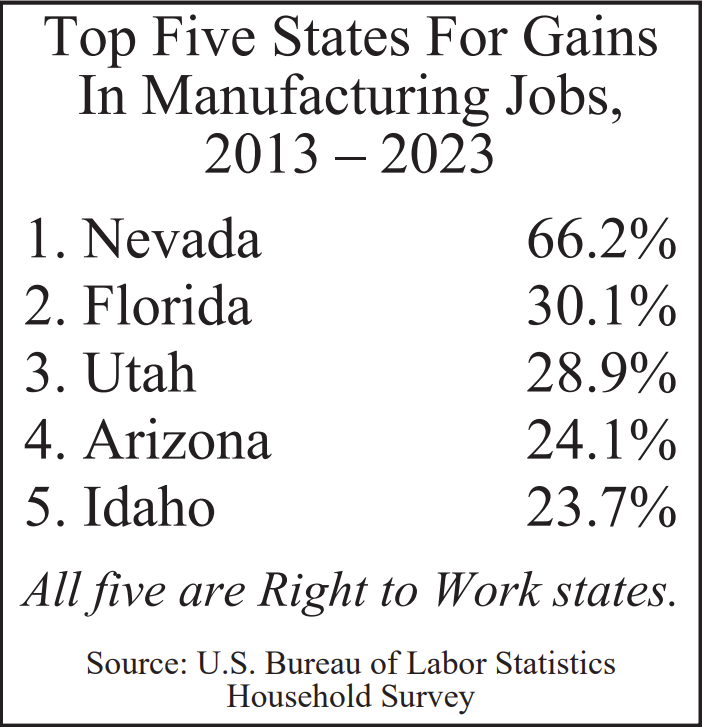Is This Any Way to Run a City’s Schools?
Leaked CTU Proposals Won’t Do Anything to Improve Schools’ Poor Performance

In early 2020, American manufacturing employment plummeted. Factories were shuttered across the U.S. and the entire world as part of an extraordinary political effort to slow the spread of the COVID-19 pandemic.
The 11% manufacturing job decline from February to April that year was one of the most sudden and dramatic setbacks for factory employees ever.
But to the surprise of many observers, manufacturing jobs began returning for American workers in late 2020, and the national employment recovery continued for the next two-and-a-half years, though U.S. factory jobs have plateaued since late last summer.
States with Right to Work laws on the books prohibiting the termination of employees for refusal to pay dues or fees to an unwanted union deserve the lion’s share of the credit for the recovery.
In 2021, 2022 and 2023 combined, according to data compiled by the U.S. Labor Department, manufacturing employment in the 27 Right to Work states combined (including Michigan, where a Big Labor-instigated reinstatement of forced unionism did not take effect until this year) rose by 518,000.
In absolute terms, that’s nearly double the overall factory-job increase for the states where firing employees simply for refusal to pay union dues or fees was still permitted.
Viewed over longer periods, the economic contrast between Right to Work and compulsory-unionism states is even more stark.
For example, from 2013-23, the 24 states that had Right to Work protections for the entire decade saw a total increase of 12.3% in private-sector manufacturing employment. That represents a gain of 682,000 jobs.
Meanwhile, manufacturing employment in the 23 states that lacked Right to Work protections for the entire decade saw an overall percentage gain of just 2.5%.
National Right to Work Committee Vice President Greg Mourad commented:
“The fact is, when they have a choice, businesses overwhelmingly favor expanding in Right to Work states, where their employees are protected from forced unionization, over Big Labor-dominated states.
“There is good reason to believe this is true even with regard to specially favored ‘green’ businesses whose owners have close ties to the Biden Administration and other union-label Democrat politicians in Washington, D.C.
“For example, a March 2023 business analysis for Reuters found that, among the ‘more than 50 EV battery, solar panel and other factories’ announced during the first six months after Joe Biden’s so-called
‘Inflation Reduction Act’ became law in 2022, a whopping 83% were located in Right to Work states.
“It seems that the business climate in many compulsory-unionism states is so bad you can’t even pay companies to invest there!
Unfortunately, so far the Biden Administration’s response to mounting evidence that few if any businesses will create new jobs in forced-dues states if they have a choice has been to double down on its pro-compulsion stance.
In a blatantly political move last August, the Biden Energy Department announced it would “prioritize” factories that corral employees into unions in awarding $12 billion in grants and loans to companies transitioning to EV manufacturing.
“With the benefits of Right to Work as compelling as they are,” commented Mr. Mourad, “it’s not clear that — even with additional billions and billions of dollars in debt spending — will the Biden Administration be able to reinvigorate manufacturing employment in forced dues states.
“But National Right to Work members and supporters won’t be satisfied until the Right to Work is protected nationwide.
“That’s why Committee members, staff and leaders are tenaciously fighting to build congressional support for, and ultimately pass into law, S.532/H.R.1200, better known as the National Right to Work Act.
“By repealing every provision in federal labor law that currently authorizes forced union dues and fees as a job condition, S.532/H.R.1200 would ensure that no business employee anywhere in America has to choose anymore between being fired and bankrolling a union he or she doesn’t want.”
This article was originally published in our monthly newsletter. Go here to access previous newsletter posts.
To support our cause and help end forced unionism, go here to donate.

Leaked CTU Proposals Won’t Do Anything to Improve Schools’ Poor Performance

Wherever Big Labor wields the power to collect forced union dues, union bosses funnel a large share of the confiscated money into efforts to elect and reelect business-bashing politicians. Employment growth tends to lag as a consequence.

Members Insist They Keep Pro-Right to Work Campaign Promises